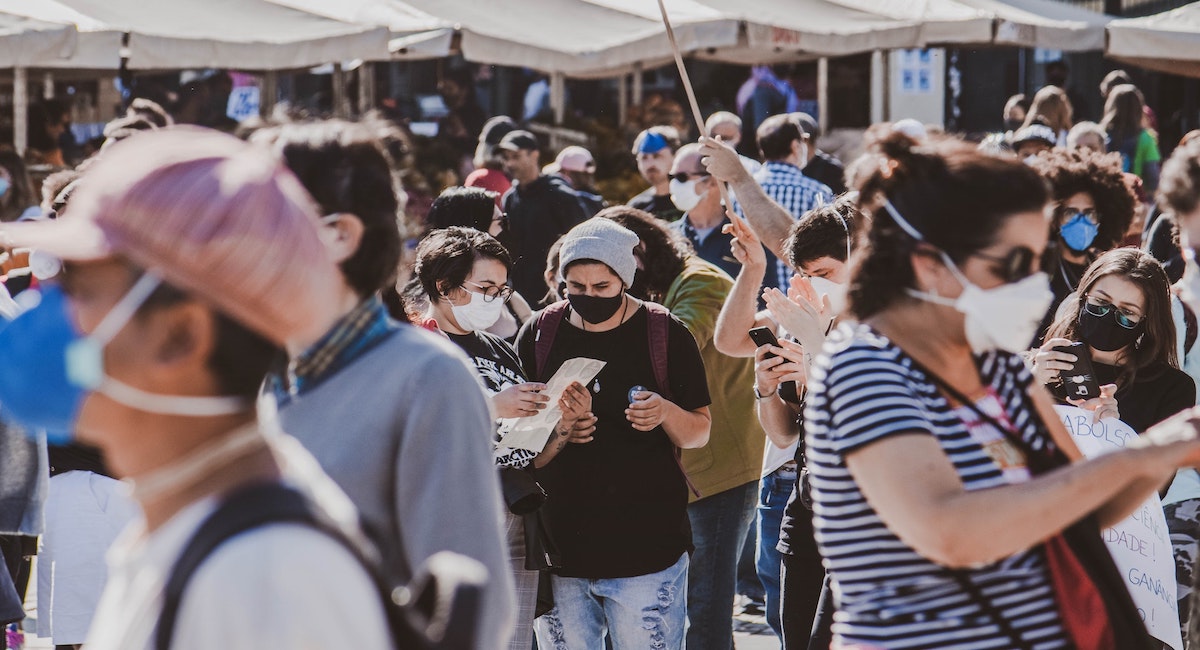Lea la versión en español | Đọc bằng tiếng Việt
An international network of health researchers reviewed 78 randomized controlled studies and concluded that wearing masks has little or no effect on spreading the flu, COVID, or other respiratory diseases.
The Cochrane collaborative published their findings in a January 2023 report which found frequent hand washing did more than masks to prevent viral infections.
At a March 3 EMS news briefing, three medical experts shared their views about the efficacy of wearing masks in light of the study. Except for vulnerable patients where masks offer an added layer of protection, their consensus was to forget about wearing masks and get vaccinated.
They also stressed the importance of not losing trust in public health officials for changing their advice over time as they work to keep up with the latest scientific research.
Masks are ‘not magic’
Dr. William Schaffner, a professor at the Vanderbilt University School of Medicine, led off the session by describing the challenges of conducting mask studies in the first place, whether in a health environment or in the community. “You can’t monitor people about their mask-wearing behavior all the time. That’s certainly something you can’t do, and of course (masks) have to be worn correctly,” he said.
While many researchers have looked at multiple physical measures to prevent people from catching a virus, the Cochrane reviewers evaluated studies that compared just three interventions: surgical masks, N95/P2 respirators, and hand hygiene.
Based on the results they were uncertain whether masks help to slow the spread of viruses but decided hand hygiene “may help to slow the spread of respiratory viruses,” Schaffner said.
Yet he also pointed out that in most cases, mask wearing was accompanied by social distancing, and… “in certain communities, we were in a lockdown. we stayed home. So, we did all those things more or less simultaneously. And it’s hard – impossible really – to determine what proportion of the reduction we saw on Covid was due to the mask itself.
As for his own advice, Schaffner emphasized that “masks are not magic.” But he said that people in high-risk groups may start wearing them again next flu season. “They will offer another layer of protection to protect me, a highly vulnerable person, from acquiring an infection from others.”
No more mask mandates
“I don’t think we can impose mask mandates on the public anymore,” said Dr. Monica Ghandi, Professor of Medicine and Associate Division Chief of the Division of HIV, Infectious Diseases, and Global Medicine at UCSF in San Francisco.
Gandhi noted a Danish mask study where no mandate was in effect at the time, and two others in Bangladesh and Guinea-Bissau where entire villagers wore masks. The study found “there was very little effectiveness” in wearing masks.
During the Delta surge, Orange County, California did not impose a mask mandate but nearby LA County did. “And there was no difference in transmission or death rates. Very importantly, the vaccination rates made all the difference,” Gandhi said.
The most important thing people could do during the pandemic is to get vaccinated, Gandhi advised. “I think we have to keep it a choice for the masking.”
Gandhi’s recently published book, Endemic, is about the politicization of public health policy. She said that closing schools during COVID was a politically driven decision and “not good for children in the Blue States, because the Red States kept their schools open.”
Dr. Mina Hakim, a pediatric specialist at South Central Family Health Center in Los Angeles, offered a similar view about masks from “down in the trenches.”
“The results of the study were clear in that surgical masks, N95 masks, did not make a difference in the transmission of Covid or the flu,” Hakim said.
“The mask is a small piece of a much bigger shield that we have against COVID. I would use the bigger piece of the shield, which is a vaccine, and I would not recommend masks for the general population,” Hakim added. Like Schaffner and Gandhi, he recommended masks for vulnerable populations.
Kids and masks
He said the Cochrane review looked at a few studies that were specifically for children, and those results were even more definitive.
“Kids are the worst at keeping things on. You’d be lucky if you have a kid with their pants on at the end of the day let alone having a mask on that increases humidity, increases difficulty of breathing, and it’s just overall uncomfortable,” Hakim said.
They’re constantly touching things, wiping their nose, taking their mask off to eat and drink. They share pencils and pens that have been in other kids’ mouths. And teenagers are horrendous at being compliant, Hakim added.
Like Schaffner and Gandhi, Hakim recommended wearing masks for vulnerable people.
“If we could provide masks particularly to those high-risk people, I think that might …increase the trust because we’re not imposing the masks on them, but making them available, so that people feel more comfortable and reassured that it’s a good thing to do,” says Hakim.
All three speakers agreed that as studies like the Cochrane report reveal new findings about the efficacy of preventive care, these should not diminish public trust.
“One of the most difficult things for the general public to understand is that we will give you our best advice today but if we learn something tonight, we may have to change that advice tomorrow, and that this is an ongoing process,” Schaffner says.





